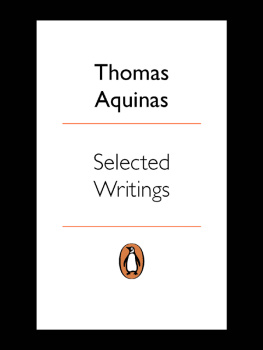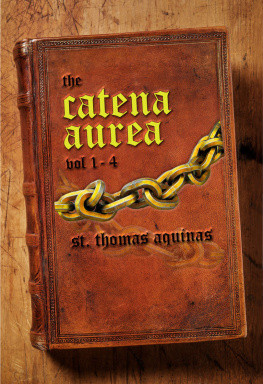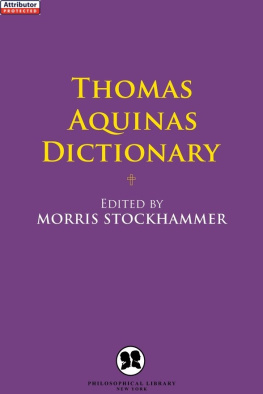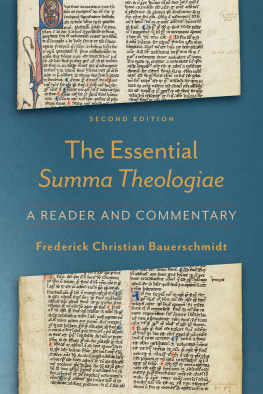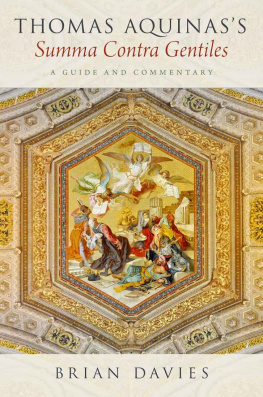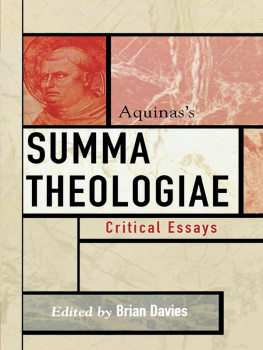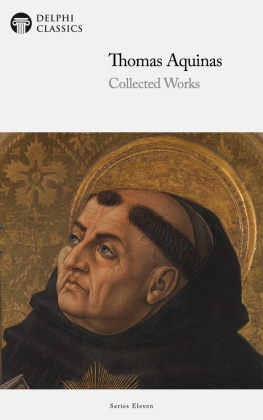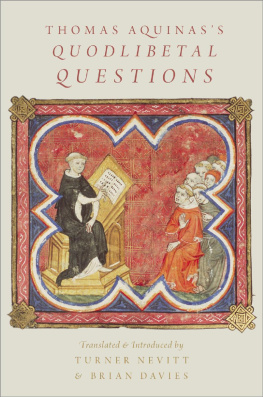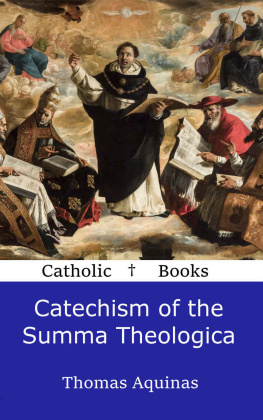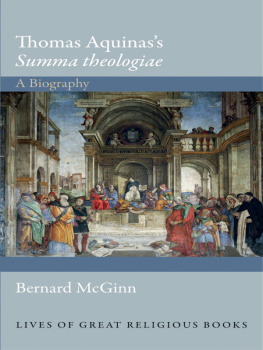Rethinking the Western Tradition
The volumes in this series seek to address the present debate over the Western tradition by reprinting key works of that tradition along with essays that evaluate each text from different perspectives.
EDITORIAL COMMITTEE FOR
Rethinking the Western Tradition
David Bromwich
Yale University
Ian Shapiro
Yale University
Steven B. Smith
Yale University
Shannon Stimson
Georgetown University
Questions on Love and Charity
Summa Theologiae, Secunda Secundae, Questions 2346
THOMAS AQUINAS
Edited, Translated, and with an Introduction by Robert Miner with essays by
Jeffrey A. Bernstein
Dominic Doyle
Mark D. Jordan
Robert Miner
Sheryl Overmyer
Yale UNIVERSITY PRESS
New Haven and London
Published with assistance from the foundation established in memory of Philip Hamilton McMillan of the Class of 1894, Yale College.
Copyright 2016 by Yale University.
All rights reserved.
This book may not be reproduced, in whole or in part, including illustrations, in any form (beyond that copying permitted by Sections 107 and 108 of the U.S. Copyright Law and except by reviewers for the public press), without written permission from the publishers.
Yale University Press books may be purchased in quantity for educational, business, or promotional use. For information, please e-mail sales. (U.K. office).
Set in Times Roman type by Newgen North America.
Printed in the United States of America.
ISBN 978-0-300-19541-5 (paperback : alk. paper)
Library of Congress Control Number: 2015947983
A catalogue record for this book is available from the British Library.
This paper meets the requirements of ANSI/NISO Z39.481992 (Permanence of Paper).
10 9 8 7 6 5 4 3 2 1
Contributors
Jeffrey A. Bernstein is Associate Professor of Philosophy at the College of the Holy Cross.
Dominic Doyle is Associate Professor of Systematic Theology at Boston College.
Mark D. Jordan is Andrew W. Mellon Professor of Christian Thought at the Harvard Divinity School.
Robert Miner is Professor of Philosophy in the Honors College at Baylor University.
Sheryl Overmyer is Assistant Professor of Catholic Studies at DePaul University.
Contents
Robert Miner
Mark D. Jordan
Robert Miner
Dominic Doyle
Jeffrey A. Bernstein
Sheryl Overmyer
Abbreviations
Textual Divisions of the Summa of Theology and Other Writings
| 1a | The Prima Pars (First Part) of the Summa |
| 1a2ae | The Prima Secundae (First Part of the Second Part) of the Summa |
| 2a | The Secunda Pars (Second Part) of the Summa |
| 2a2ae | The Secunda Secundae (Second Part of the Second Part) of the Summa |
| 3a | The Tertia Pars (Third Part) of the Summa |
| a./aa. | Article/Articles |
| ad 1, ad 2 | Reply to an opening argument |
| arg | Opening argument (objection) |
| bk. | Book |
| chap. | Chapter |
| corp | Body or response of an Article |
| d. | Distinction |
| pr | Prologue of a Part or a Question |
| pt. | Part |
| q./qq. | Question/Questions |
| sect. | Section |
| sc | Argument to the contrary (sed contra) |
Other Abbreviations
| can. | Canon |
| col. | Column |
| ep. | Epistle |
| hom. | Homily |
| serm. | Sermon |
| tr. | Tract |
Introduction
Reading Thomas on Charity in the Summa of Theology
ROBERT MINER
Thomas as Educator
Thomas Aquinass unfinished masterwork, the Summa of Theology, is known for its dispassionate posing of questions, not to mention its considered distinctions and measured judgments. Written in a tranquil, almost colorless Latin, the Summa hardly seems to qualify as an incendiary work. Yet it has provoked incendiary reactions. There is the legend of Martin Luther throwing the book into the flames.
Why should a text with a surface as tranquil as the Summa of Theology provoke such unbalanced reactions? Do we find an answer in the externals of Thomass life? The bare facts can be stated briefly. leaving his masterwork unfinished. He died three months later.
The externals of Thomass life reassert the question: Why should the texts of a Dominican priest known more for his mild equanimity than his rhetorical brilliance arouse responses that range from indignant rejection to virtual idolatry? Beneath the surface of Thomass unflashy prose, we can discern an extraordinarily powerful voicethe voice of a teacher who wants to persuade his readers. But to persuade them to do what? To submit to the decrees of Roman Catholicism, incendiary partisans would have us think. But can this be Thomass real aim? In the Prologue of the Summa, Thomas indicates his frustration with the dominant modes of theological teaching. Newcomers to Christian theology, he says, get worn down by endless repetition of the same thingsa dulling monotony that produces distaste and confusion in the souls of students. Or they find themselves addressed in a way that does not even try to distinguish their real needs from their sham needs. The principle of teaching is extrinsic, according to what the exposition of books used to require, or according to what some occasion for disputing a question would provide (1a pr). No suitable order of learning enters the picture. This ensures a proliferation of useless questions, articles, and arguments. Even if true things are conveyed through these questions, articles, and arguments, they are not taught efficaciously. They do nothing to lead newcomers closer to what Thomas regards as the ideal condition of the human beingthe condition of blessedness (beatitudo).
Thomas writes the Summa as a teacher who cares about people and their progress toward blessedness. He arranges the work according to a conception of the order of learning, an order reflecting what he judges to be most necessary and most effective in addressing the needs of newcomers. This arrangement has not always been respected. It is routinely violated by those who plunder the Summa, taking its words as proof-texts for their own notions, often adopted well before the discovery of Thomas. But, one might ask, might a similar charge be brought against the present edition? The charge has some force, since the fullest respect for Thomass order of learning would require one to begin at the beginning. The present editiona selection of Questions taken from the second subdivision of the Second Part of the Summaseems to flout this requirement. Is it not also a
To this charge, it may readily be granted that an ideal reader would encounter the questions on charity only after having read and assimilated the preceding Questions. But most of us cannot be ideal readers. We tend to meet Thomas where we are, as we are. Not many who desire greater familiarity with Thomass thinking about moral topics are in a position to undertake the demanding task of reading the Summa whole. Some give up reading Thomas at all, resorting to summaries or abstracts of the philosophy of Aquinas. These are misleading for a host of reasons, not least because they rarely question the dubious assumption that Thomas writes autonomous philosophy (as distinct from making use of philosophy within theology). Even when they are not driven by agendas of their own, summaries are necessarily a poor substitute for Thomass own writing. Rarely does one see Thomas through the grille of apologetic renditions or academic expositions, at least when taken as substitutes for the texts.
Next page

